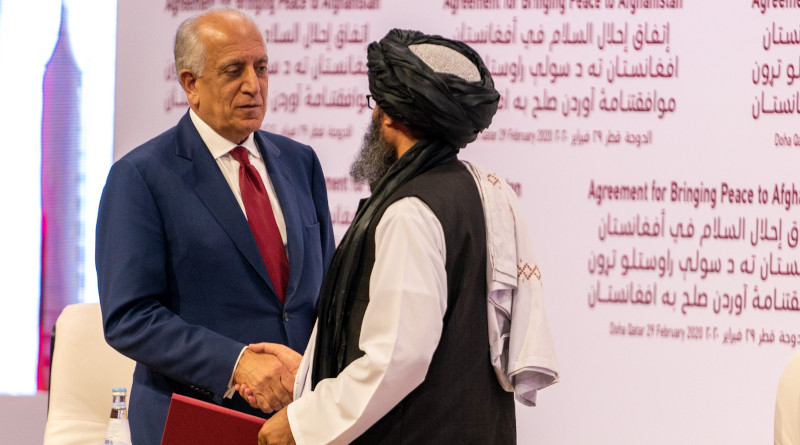Afghanistan: Concerns Regarding Political Prospects And Washington-Kabul Relations – Analysis
By IPCS
By Fawad Poya and Bushra Tariq*
Developments in the run up to and post the signing of the February 2020 US-Taliban agreement have generated considerable concern regarding the political future of Afghanistan as well as regarding the prospects of the US-Afghanistan partnership, especially the Strategic Partnership Agreement (SPA) and the Bilateral Security Agreement (BSA). This commentary examines the operative aspects anchoring those concerns.
The US-Taliban Agreement
On the day the US-Taliban agreement was signed, Afghanistan and the US issued a joint declaration covering several issues, especially touching upon those in the SPA and in the BSA. In the joint declaration, the US and the Afghan governments took “note” of the US-Taliban agreement, signalling the non-binding nature of the US-Taliban agreement on the Afghan government. At the same time, legal scholars concerned with the “binding” aspect of the US-Taliban Agreement categorise ‘Peace Deals’ into three types: a) a pre-negotiation deal; b) a framework agreement; and c) an implementation deal. The US-Taliban agreement is not a “treaty,” and as such falls into the ‘pre-negotiation’ category, i.e. it is non-binding or enforced on the non-party—the Afghan government.
Legal Obligations Under SPA & BSA
The SPA and the BSA are relevant to the parties involved, i.e. Washington and Kabul. Under the Vienna Convention on the Law of Treaties, 1969 (VCLT) too, there is no general right to unilateral withdrawal from treaties. Under the VCLT, the right to opt out of a treaty is by default mutual and not unilateral. However, the VCLT recognises certain exceptions such as: if the treaty itself makes provision for unilateral withdrawal; if it is terminated by mutual consent of parties; or by any subsequent agreement between the parties of the earlier treaty. In this regard, Article 26 of the BSA (which mirrors part VIII of the SPA), establishes the conditions regarding entry into force, amendment and termination of the agreement by providing that “[t]his Agreement shall remain in force until the end of 2024 and beyond, unless terminated pursuant to paragraph 4 of this Article.”
Thus, there are two routes to terminate the BSA: first, when its validity ends at the end of 2024 (unless the parties agree to continue with the agreement); and second, by fulfilling the conditions provided in paragraph 4, i.e. by mutual written agreement or by either party upon giving two years’ written notice to the other party through diplomatic channels. In the absence of actions towards these provisions, the US has to follow the prescribed channel provided in the agreements signed with Afghanistan in order to fulfil its obligations under international law.
Political Implications of the US-Taliban Agreement
Pursuant to the US-Taliban Agreement, the Afghan government has, despite not being a party to it, agreed to commence a negotiation process with the Taliban with the objective of ending the long-running armed conflict. However, the Taliban’s outlook towards (and by extension, expectations regarding) political and legal frameworks in Afghanistan are problematic.
For example, the Afghan constitution recognises Afghanistan as an Islamic Republic (Article 1), and Islamic Law as the law of the land (Articles 2 and 3). Article 3 also stipulates that “No law shall contravene the tenets and provisions of the holy religion of Islam in Afghanistan;” and Article 2 contains provisions governing the status of followers of other faiths as well. Article 130 stipulates that in case there is no provision in the constitution or other laws, the courts shall rule in on the basis of Hanafi jurisprudence.
Yet, the Taliban is not satisfied with the existing constitution and has for long criticised it for being “un-Islamic.” The Taliban’s preference is more towards the Saudi Arabian and the Iranian framework of constitutions, which are rigid in nature and xenophobic in content. For obvious reasons—e.g. to not disgruntle Taliban fighters on the ground and their ally al Qaeda internationally—the Taliban seeks to replace the existing Afghan constitution with a new, religiously-inclined one which suits their own ideology.
Furthermore, the current Afghan constitution recognises equal rights for all Afghan citizens, including women, without any caveats. However, Taliban leaders have consistently added the rider of ‘within the boundaries of Islamic law’ on the matter of equal rights for men and women. For example, in his New York TimesOp Ed, the Taliban’s Deputy Chief, Sirajuddin Haqqani, said that the Taliban will also establish equal rights for men and women, albeit within the contours of Islam. However, given how there are several varied streams of theological thoughts within Islam, the Taliban’s riders give cause for concern.
Looking Ahead
Ironically, by signing a deal with the Taliban, the US appears to have undermined the commitment to support the constitutional order that it made in its agreement with Afghanistan. At present, optimism regarding a potential peace deal would be premature. If Washington seeks a reliable partner in Kabul in the future as well, the US government must remain committed to delivering on their treaty obligations under the BSA and the SPA—i.e. not only those pertaining to counter-terrorism, but also those related to upholding the constitutional order, human rights, women’s rights etc.
*Fawad Poya and Bushra Tariq are PhD scholars at the Faculty of Legal Studies, South Asian University, New Delhi, India.

